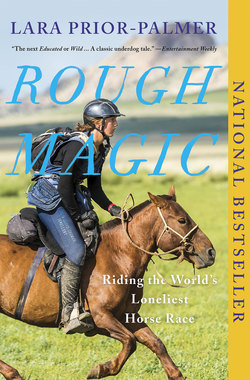Читать книгу Rough Magic - Lara Prior-Palmer - Страница 13
На сайте Литреса книга снята с продажи.
ОглавлениеV
The race was set to begin on August 4. In the first week of July, the organizers sent me a month-by-month “Your Year of the Derby” calendar. They had sent this to everyone else at the beginning of the year, since they had applied on time. We were advised to assemble our gear in February, get vaccinated in April, commence language-learning in May, use July to visit relatives and update our wills, and devote the entire year to training.
Maggie, an endurance-riding specialist, had apparently been sending handouts on fitness, navigation, horse pacing, and hydration. “You’ve missed those now and it’s too late for you to be training anyway. You can’t get fitter in the final two weeks,” she stated on the telephone. I gulped and clung closer to the daft resistance within me.
The month-by-month calendar from the organizers read: You could do all your preparation in July if you have unusually low blood pressure—no? Thought not.
I do happen to have low blood pressure, and a low heart rate. Perhaps that would help. When I was small and we measured our vital signs in class, Mrs. Bleakley said my results meant either I was an athlete, or I was nearly dead, or I couldn’t count. Likely the latter—despite being a decade older when I entered the race, I still struggled with numbers and time.
July rolled by. I researched all the race’s sore statistics and found that Lucy was right. Every year just over half the field made it to the finish. No woman had ever won the Derby, nor had a Briton. South Africans tended to triumph. The youngest person ever to cross the finish line had been twenty-three.
Me? I was not young. I had long since given up my rubber ducklings, I had finished high school, I felt ancient as a walnut.
Meanwhile, my father had forgotten his resistance. He helped me draft letters to family and friends asking for contributions to the charities I had chosen to ride in the name of—Macmillan Cancer Support and Greenhouse Sports. The latter, which sets up sports programs for London teenagers struggling with school, was a charity that amazed me, perhaps because sport had felt like my own lifeline in the city.
I needed to focus on this campaign before departure. No one would donate when I returned from the race having managed only 10 of the 1,000 expected kilometers. Aware now that the other riders had signed up for the Derby in October, giving them ten months to train and plan how much toilet paper to pack, I implied in my letters that I, too, had been aiming at the race for about a year.
When I was young, Dad had often called me “Sporty Mouse.” I was flat-chested and athletic enough that you couldn’t tell me apart from my brothers. In fact, as far as I was concerned, I was a boy. I existed in the mold of my siblings. I scorned at girly-girls with Barbies and bolted from pink, that color of social catastrophe—sickly and sweet, nothing like me. I sat best with blue, the color of distance and coldness, the favorite of my brothers and mother, too. “Where’s my willy?” I demanded of her in the bath at age three. She and I have hair growing out of us in surprising places. She says the forests on my legs and the two-inch hair growing by my belly button mean I’m strong.
The other half of the picture is one I tended to ignore. Mum sometimes referred to me as “Sensitive Mouse.” My stomach has ached since I was fifteen, I blush all the time, and my skin rashes red when you so much as brush a finger over it. You know what they say about thin-skinned people: a highly strung, sensitive lot, prone to withering like flowers in winter. Doctors do not prescribe them 1,000-kilometer horse races.
We were supposed to have seen the warning on the website before signing up:
Before you consider applying for this race, we want to point out how dangerous the Mongol Derby is. By taking part in this race you are greatly increasing your risk of severe physical injury or even death. The nature of the Derby means that if you do fall off, the response time of the medics is going to depend on where you are. If you are seriously injured you may be hundreds of miles away from the nearest hospital. The Mongol Derby is an extremely physically demanding and dangerous race, and holds the title as the toughest horse race in the world for good reason.
I had missed it.
I didn’t understand the coming race, and wouldn’t until I rode in it. I did, however, assume that something would go wrong for all of us riding and that we would need to step back and ponder the silliness. After all, didn’t entering such a competition demand a deviant imagination? Could we envisage ordinary days blown from their moorings? Could we pretend that moving through space with unbearable intensity had been a natural habit our whole lives?
Even some of the Mongolian parents I would meet, whose eight-year-old children could gallop for hours without saddles, thought the 1,000-kilometer distance crazy. No wonder, then, that the race had been thought up elsewhere—by a man in Bristol called Tom Morgan. Tom found out that the steppe’s medieval messaging systems were still in place until the 1960s, and with the guidance of an original postal rider, he helped stage the first Mongol Derby five years before I entered. The race had since grown, and was now summoning a field of thirty to forty riders annually.
